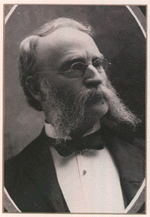Marshall Mortimer Murdock, founder of the Wichita Eagle, and for nearly forty years intimately identified with the history and progress of Sedgwick county, was a native of the Old Dominion, having been born in the Pierpont settlement in Virginia (now West Virginia) in 1837, the year Victoria ascended the throne of England. His earlier ancestors were Scotch, but his more immediate ancestors lived in the north of Ireland, where his grandfather engaged in rebellion against the British government about the time of the Revolutionary War in America, and was compelled to flee to this country to save his life.
He was a metal worker, and after settling in Virginia engaged in the iron-molding business. His son Thomas, a man of quick conscience, grew up in a settlement of slaveholders and developed a strong abhorrence for the institution of slavery. He married Catherine Pierpont, a relative of Governor Pierpont, and the subject of this sketch was their firstborn.
Soon after his marriage Thomas Murdock removed with his family to Ohio, and for a time was engaged in business at Ironton. While living there Marshall Murdock attended the public schools and began his apprenticeship at the printer's trade.
About this time the fight for a "free Kansas" was on, and the entire nation was interested in the outcome of the struggle. Thomas Murdock's business venture in Ironton had not been a successful one, and with his intense dislike for slavery, he determined to join the freestate forces in Kansas. Putting his worldly goods and his family in two covered wagons, he started for Kansas. He drove one of the teams, and Marshall, or "Marsh" as he was generally called, drove the other. After an overland journey of several weeks they reached Topeka, near which town Thomas Murdock "took up" a farm. Over that farm John Brown often passed with slaves taken from their masters in Missouri and other southern states.
When gold was discovered in the Pike's Peak region Marshall Murdock caught the "fever" and set out for "hills of golden promise." There is little doubt that he was the first to discover silver where the city of Leadville now stands, but in those days gold was the attraction, and his discovery was not turned to account until some years later. While he was in the gold fields the Civil War broke out, his father and two of his brothers enlisted, and Marshall returned to Kansas to take care of his mother and the younger members of the family. He found employment in a printing office at Lawrence, and was thus engaged when Quantrill made his raid on that city in August, 1863. Young Murdock saved his life by concealing himself in a well while the guerrillas were plundering the town. A few bullets were fired into the well, but he escaped unhurt. When the confederate General Price threatened to invade Kansas, in 1864, Marshall Murdock entered the service as lieutenant colonel of the Osage and Lyon county militia, which aided in repelling the invaders.
In 1863 Colonel Murdock married Victoria Mayberry, of Douglas county, and soon after his marriage located at Burlingame, where he established the Chronicle. He served as state senator for Osage and Lyon counties. In 1872, when it became evident that the Santa Fe railroad was to be extended through Wichita, Colonel Murdock removed his printing office to that city and founded the Eagle. Soon after locating there he was elected state senator for all that part of the state lying between Butler county and the Colorado line, defeating David L. Payne, who subsequently started the agitation that resulted in the opening of Oklahoma to settlement. Colonel Murdock served as postmaster of Wichita for a number of years prior to the inauguration of President Cleveland, in 1885. He was again appointed postmaster by President McKinley and held the office until the time of his death.
Colonel Murdock died on January 2, 1908, and is buried on the hill overlooking the city which he helped to build, and which stands as a monument to his patriotism as a citizen, his courage and optimism as a journalist, and to his great influence in the public life of his day. One son, Victor, represented the Eighth Kansas district in the lower house of Congress from 1903 to 1915, and another son, Marcellus, is now conducting the Eagle along the lines established by his illustrious father.
Also See:

